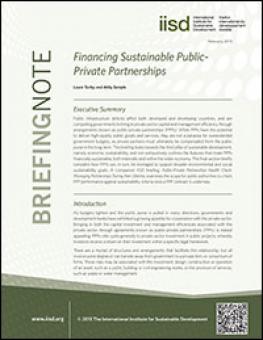
Financing Sustainable Public- Private Partnerships
Public infrastructure deficits afflict both developed and developing countries, and are compelling governments to bring in private sector capital and management efficiency through arrangements known as public-private partnerships (PPPs).
While PPPs have the potential to deliver high-quality public goods and services they are not a panacea for tight government budgets, as private partners must ultimately be compensated from the public purse in the long term. This briefing looks towards the third pillar of sustainable development, namely economic sustainability, and non-exhaustively outlines the features that make PPPs financially sustainable both internally and within the wider economy. The companion briefing to this document, Public-Private Partnership Health Check: Managing partnerships during their lifetime, looks at the potential to enhance the economic, environmental and social sustainability of PPPs that are already operational.
You might also be interested in
Green Public Procurement in India
This report analyzes the status of green public procurement (GPP) in India and suggests key strategies for advancing sustainable procurement practices.
The Role of Multilateral Development Banks for Low-Carbon Procurement in the Infrastructure Sector
This report examines the critical role of multilateral development banks (MDBs) in advancing low-carbon procurement within the infrastructure sector.
Green Public Procurement in Indonesia
This report explores the state of green public procurement (GPP) in Indonesia and offers key strategies for advancing sustainable procurement practices.
Monitoring Progress in Green Public Procurement
This report outlines the importance of monitoring progress in green public procurement (GPP) and highlights various methodologies, challenges, and recommendations.